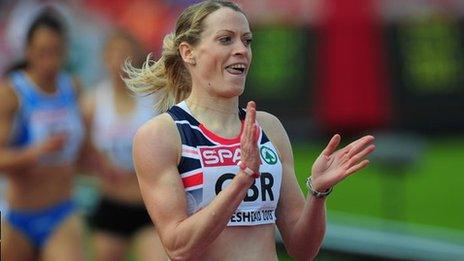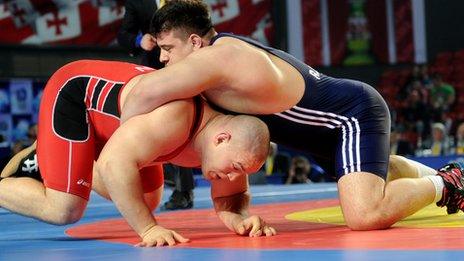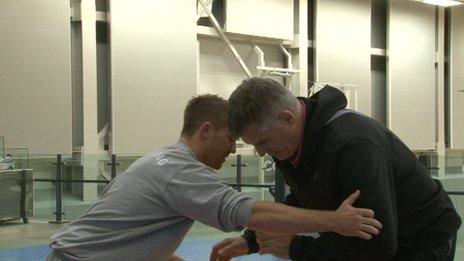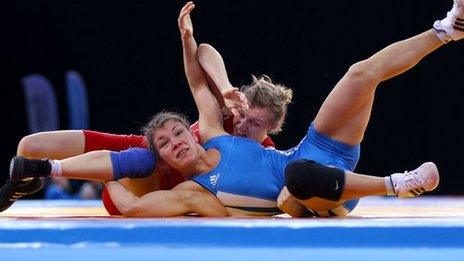Commonwealth Games: Wrestler McFarlane seeks home advantage
- Published
Feature - Wrestling champion takes on Beattie
The terms are enough to serve as a warning: the gut wrench, the suplex, crossed ankles, double-leg attack.
Wrestling is not for the lily livered. Commonwealth Games spectators at Glasgow's SECC next year will witness technique, strength, courage and strategy, not panto antics and comedy costumes.
Ross McFarlane takes the sport seriously, a wise idea when danger lurks in every training session and competition bout.
The 26-year-old from Milngavie, near Glasgow, practises at the marvellous Emirates Arena in the city's east end, a complex that has reshaped the area around Celtic Park and that will throb with Commonwealth Games activity next summer.
"I find wrestling immensely tough because not only are you training in the gym, which is hard work, but you are being battered and bruised on a daily basis on the mat," he tells BBC Scotland, his blackened eye adding weight to his point.
"It's a full-contact sport and when you are on the mat training you're doing techniques on your partners all the time.
"Although you both know what you are doing it doesn't stop it from being full impact; you still take a couple of bruises."
McFarlane trains five days a week, before or after work as assistant manager at a leisure centre.
As this year's British champion at 55kg, he can almost be measured for the Scotland blazer, yet team manager Colin McLaren warns against complacency.
"You can never tell in wrestling, but as it stands he's looking good," he says.
By that, he means that a wrestler's dreams of a medal can be wrecked by injury. A broken bone or torn muscle may be one attack away.
"It's the only sport that uses every muscle in your body," explains McLaren, who runs the Tullibody Wrestling Club and who was Scotland's assistant team coach in Delhi in 2010.
"You've got to do the training to accommodate that."
McFarlane demonstrates an astonishing neck-strengthening routine called "the pirouette". It involves placing the top of his head on the mat, keeping it almost static and stepping around in a full circle.
"You have to be disciplined to get yourself here in the morning," he explains.
"We've got a great team of coaches and managers behind us but only you can do it on the day on the mat."
McFarlane is coached by Moldovan duo Vladimir Gladkov and Viorel Etko. They and McLaren will whittle the men's and women's squads down to 14 places to recommend to Commonwealth Games Scotland for inclusion in the team.
With the British title in his bag, McFarlane, who now lives in Glasgow's east end, wants to perform well at the Commonwealth Championships in Johannesburg in December to cement his Scotland place.
Wrestling was announced as the winning bid by IOC President Jacques Rogge, after receiving a majority of 49 votes
Two years ago, he came fifth when that tournament was held in Melbourne. That was just a year and a half after his return to the sport.
"I started wrestling when I was 14 and my uncle took me to my local club, Milngavie Wrestling Club," McFarlane recalls.
"I really enjoyed it. I was going down every Friday and Saturday. Then at 17 I went off to Glasgow University to study sports science and practised only from time to time.
"In 2010 I went back down to the club in Milngavie and got involved again.
"I was invited along to train with the Scotland squad [before they left for Delhi] and I've not stopped since, especially finding out there was the potential to be involved in the Commonwealth Games in my home city."
He is an exponent of freestyle wrestling, also called Olympic freestyle wrestling, which differs from Greco-Roman wrestling in that attacks are allowed on the legs.
"One of the best ways of describing it is as a fast, physical game of chess," he suggests.
"To anyone looking at it, it's just two guys trying to wrestle each other to the ground, but it's definitely about trying to outwit your opponent.
"When you see the high-level guys doing it, it's very slow but they are psyching each other out, they are seeing what their opponent is trying to do, and when they actually go for something it is incredibly quick."

McFarlane moves to execute a painful crossed ankles move
This year McFarlane has competed in Bulgaria, Madrid and Moldova - essential, he says, to build experience.
The athlete agrees with the team manager's assessment that India and Canada are likely to be the nations chasing the most wrestling medals next year.
"It's one of India's main sports," says McLaren, "while in Canada it's in their schooling system."
He is now pacing himself for making the Games team.
"I'll keep training hard and hopefully I can get beat off my competition and make sure I get in next year," he says.
"In Scotland it isn't the most popular sport. We want to make it a spectacle in Glasgow and raise awareness of it because I think the potential is out there for people to get involved.
"You can slowly see the build-up around the city. It's getting quite real now.
"It will be one of the biggest days of my life so far. I am really excited about it and I know there is excitement around the team as well.
"Being in your own back yard, having your friends and family there, I think it's going to be amazing, for this city as well."
Sport Nation is broadcast on BBC Radio Scotland on Saturdays at 1105 BST
- Published25 September 2013

- Published8 September 2013

- Published26 September 2013

- Published12 August 2016
